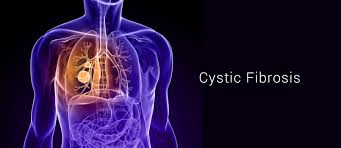- Home
- Departments
Departments Of Cystic Fibrosis
Cystic- FibrosisCystic fibrosis (CF) is a genetic disorder characterized by the buildup of thick, sticky mucus in the lungs and other organs. It is caused by mutations in the cystic fibrosis transmembrane conductance regulator (CFTR) gene, which regulates the movement of salt and water in and out of cells. The abnormal function of the CFTR protein leads to the production of thick mucus that can clog the airways and impair the function of various organs in the body.
Key Features of Cystic Fibrosis:
Respiratory Symptoms: Respiratory symptoms are the hallmark feature of cystic fibrosis and typically present early in life. These symptoms may include chronic cough, frequent lung infections (such as pneumonia or bronchitis), wheezing, shortness of breath, and poor growth or weight gain despite a good appetite.
Pulmonary Complications: Over time, the buildup of thick mucus in the airways can lead to progressive lung damage, chronic inflammation, and scarring (fibrosis). This can result in respiratory complications such as bronchiectasis (permanent dilation of the bronchial tubes), recurrent respiratory infections, chronic obstructive pulmonary disease (COPD), respiratory failure, and ultimately, respiratory insufficiency.
Gastrointestinal Symptoms: Cystic fibrosis can also affect the digestive system, leading to gastrointestinal symptoms such as poor weight gain, difficulty gaining or maintaining weight (failure to thrive), frequent greasy or bulky stools, abdominal pain or discomfort, intestinal blockages (obstructions), and malabsorption of nutrients.
Other Organ Involvement: In addition to the respiratory and gastrointestinal systems, cystic fibrosis can affect other organs and systems in the body, including the sweat glands, pancreas, liver, sinuses, reproductive system, and bones. Complications associated with cystic fibrosis may include pancreatic insufficiency (difficulty digesting food), liver disease, nasal polyps, infertility, osteoporosis, and diabetes.
Diagnosis and Management: Diagnosis of cystic fibrosis typically involves a combination of newborn screening, sweat chloride testing, genetic testing, and clinical evaluation. Treatment of cystic fibrosis aims to manage symptoms, prevent complications, and improve quality of life. Therapeutic approaches may include airway clearance techniques (such as chest physiotherapy and nebulized saline), medications to thin mucus and improve airway clearance (such as inhaled bronchodilators and mucolytics), antibiotics to treat lung infections, pancreatic enzyme replacement therapy, nutritional support, and targeted therapies to modulate CFTR protein function.
Prognosis: The prognosis of cystic fibrosis has improved significantly in recent decades due to advances in medical care and treatment options. However, cystic fibrosis remains a chronic and progressive condition with no cure, and individuals with cystic fibrosis may experience a shortened lifespan and reduced quality of life. Early diagnosis, comprehensive management, and multidisciplinary care are essential for optimizing outcomes and improving long-term prognosis in individuals with cystic fibrosis.

